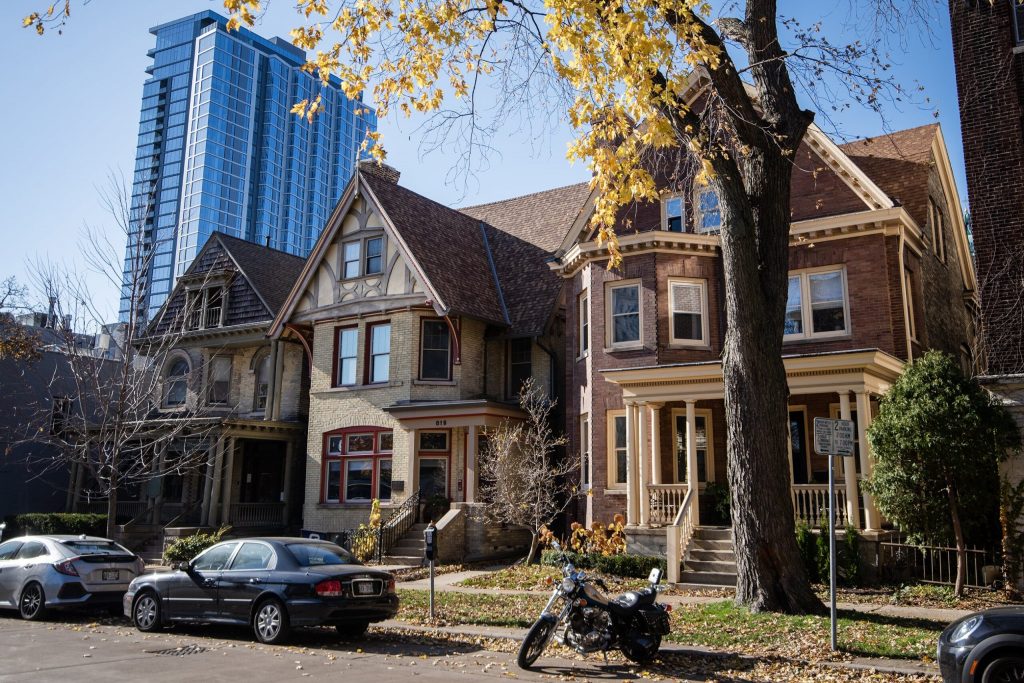Milwaukee’s Rents Among Fastest Rising In U.S.
Up 6.4% in past year, 10th highest hike among metro areas in nation.

A “for rent” sign is seen outside of a home on Griffin Street in Milwaukee on June 29, 2021. Isaac Wasserman/Wisconsin Watch
Catherine Delgado lives in an apartment on Milwaukee’s south side with her five children. For the past few months, she said she has been looking to move out to find a safer place for her and her kids.
But she’s had no luck finding a new home within her budget.
“You want the best for your kids, you want to have better for them. And we can’t,” she added. “We have to stick where we are because rent has gone up so much. It’s not reasonable and affordable to move anywhere else.”
Delgado isn’t alone. An analysis from Rent.com found Wisconsin and the greater Milwaukee area have some of the fastest-growing rents in the nation.
Milwaukee’s median rent grew 6.39 percent from March 2023 to March of this year, according to the analysis. That’s the 10th highest rate among metro regions in the nation. Wisconsin saw a similar increase of 6.43 percent during that same period, the ninth highest rate among states.
That’s something Eric Halverson and his girlfriend found out the hard way when they were looking for a new apartment in the Milwaukee area this year. With their lease up in May, the couple started to search for a new place in January.
“The more we look, the more we realize how ridiculous just everywhere has gone up and up and up and up,” Halverson said.
“Mostly everyone I know, especially my age, is really struggling right now and they’re all fully aware of how hard it is to find somewhere to live if you need to in the city or near the city,” said 34-year-old Halverson.
Milwaukee’s median monthly rent is at $1,835, according to the analysis. That’s lower than the national median of $1,987, but higher than Wisconsin’s statewide median of $1,602.
Nationally, rents have been rising for years. Rent prices in March were 21.78 percent higher than they were four years ago, according to Rent.com.
Kate Terhune, the director of brand for Rent.com, said the home sales market isn’t helping. A recent Wisconsin Policy Forum report found Wisconsin home prices are rising faster than incomes.
“The house prices being so high right now, it’s pushing a lot of people to the rent market just in general because they’re like, ‘I can’t afford to spend a 10 percent down payment on a house right now. I’m going to stay in the rental market for longer,’” Terhune said.

The sun shines on residential buildings Wednesday, Nov. 15, 2023, in Milwaukee, Wisconsin. Angela Major/WPR
Landlords have said inflation has contributed to rising prices, while developers and housing advocates have said Wisconsin didn’t build enough housing units following the 2008 Great Recession.
Delgado said her landlord hasn’t raised her rent yet, but she’s worried that could be coming.
“It’s depressing — you want to live in a nice place, and when you can’t, it puts you down, you feel hopeless, helpless at times. You wish you could do more and you can’t,” Delgado said.
“The kids normalize gunshots and they shouldn’t be numb to that stuff, but they are,” she said.
A 2023 report from Forward Analytics, the research arm of the Wisconsin Counties Association, found the state needs to build at least 140,000 housing units by 2030 to keep pace with current demand, and 227,000 units if it wants to grow its working-age population. The National Low Income Housing Coalition estimates the state has a shortage of 123,864 rental homes affordable and available for low-income renters.
Meanwhile, Halverson said spending months looking for an apartment he and his girlfriend could afford has been a daunting task.
“It’s been weighing on me. It’s like a giant sloth on my back,” Halverson said. “I try not to give it too much energy, but it’s real. You’ve got to live somewhere.”
Rents in Wisconsin — specifically Milwaukee — among the fastest rising in the nation was originally published by Wisconsin Public Radio.
If you think stories like this are important, become a member of Urban Milwaukee and help support real, independent journalism. Plus you get some cool added benefits.





















